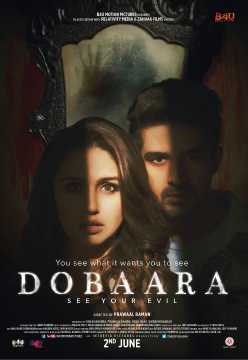
Shriram Iyengar
Mumbai, 02 Jun 2017 15:20 IST
The inability of the film to hold back its surprises proves to be its greatest flaw.

A woman is burned at the stake in 16th century England, and her spirit is imprisoned in an old mirror. The woman, as the opening voiceover says, is innocent and accused of being a witch. It is this ghastly spirit, empowered woman some would say, that the siblings in Prawaal Raman's Dobaara: See Your Evil are out to destroy.
Raman's film is based on the 2015 Hollywood supernatural thriller, Oculus, directed by Mike Flanagan. Flanagan, who also serves as the executive producer of Dobaara, was on social media recently praising the film and its 'adaptation' of his hit film. However, this could be among his duties as executive producer. There is not much 'unexpected' or 'surprising' in Raman's film, despite some snazzy camerawork and sound.
The film begins with a frenzied Natasha Merchant (Huma Qureshi) seeking to destroy the mirror which led to the murder of her entire family. She is supported in this quest by the only other survivor, Kabir (Saqib Saleem) her brother. Though skeptical of the entire incident, Kabir decides to help his sister in her 'crazy' quest.
The film continues steadily till the middle, with the entire incident being played out as a misconception in the minds of the two siblings. However, it is after the interval that the 'spirit' does make an appearance. For those who have seen Oculus, the lengthy explanation leading to the eventual activity is dampening. The director's screenplay tends to explain the actions of the protagonists, at every step, making the whole point of a 'thriller' redundant.
Saqib and Huma, real life siblings, take some time to get into the groove of their conflicting relationship onscreen. The dialogues of the film, a mix of Hindi and English, are also jarring and forced.
Adil Hussain and Lisa Ray are competent, and Hussain's slow descent into madness makes for some compelling viewing. For their part, Saqib and Huma hold up the second half with their credible shock and surprise. That is more than the audience will manage. The witch, Barbara Smith (Madalina Bellariu) is shown so beautiful and seductive that her murderous rage does not carry through. In the end it almost seems justified that an innocent woman is wreaking havoc for the wrongs done to her. As she says, "Humans have the capacity for every evil." She is not evil, just angry.
The trouble with remaking a popular film is in the ability to make a difference without losing the original effect. Oculus was hugely successful owing to the screenplay that unveiled the truth behind the murder that broke the family, while constantly shifting the timelines to keep the audience rivetted. Raman manages the second part quite ably with red herrings all over. He sticks religiously to the original script, which in the age of Netflix and Torrents, makes Dobaara appear very predictable. Even otherwise, haunted mirrors, remote castle-like houses where serial murders occur, heroes seeking revenge caught in the mental trap are very cliched tropes. This is not to say the film does not have its moments. The hallucinations and the blurring timelines make for interesting viewing. Interesting being the adjective, not thrilling.
Anuj Dhawan's camerawork is a mix between The Blair Witch Project (1999), The Conjuring (2013) and a Vikram Bhatt mystery set in a remote castle-like manor. There are a few shock moments that deliver some thrill, but Dobaara: See Your Evil has no special surprise. That is fatal to a supernatural thriller.